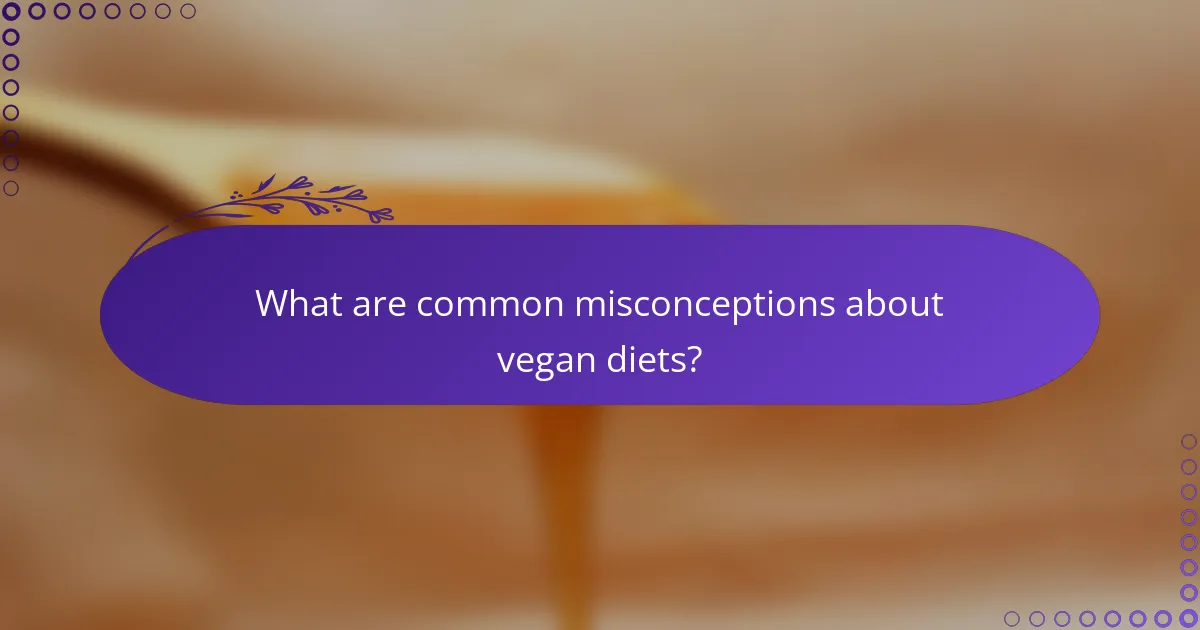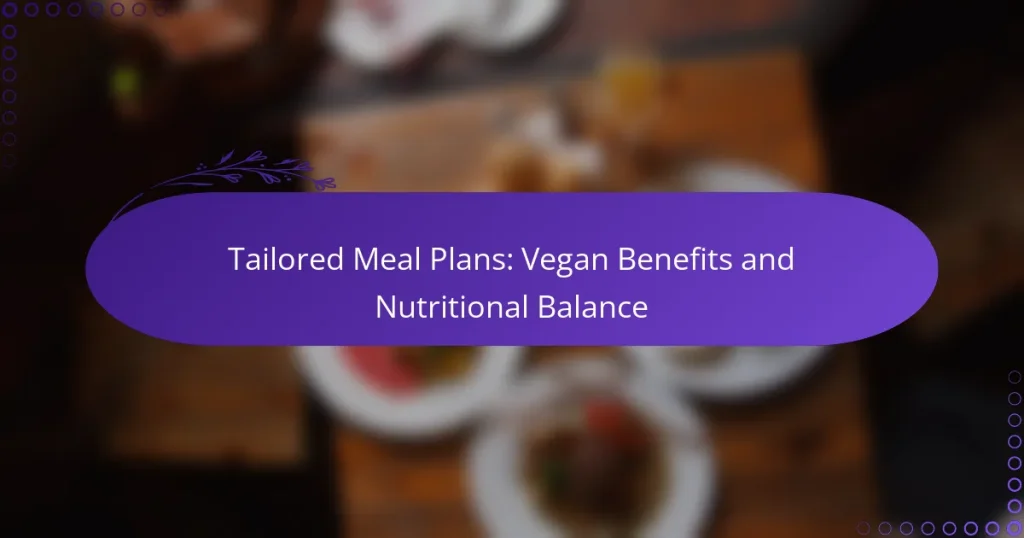Tailored vegan meal plans provide a range of benefits, such as improved nutritional balance and support for weight management. By emphasizing plant-based foods, these plans not only enhance energy levels but also contribute to reducing the risk of chronic diseases and promoting environmental sustainability. To achieve optimal nutrition, it’s essential to include a variety of whole foods that offer essential nutrients while maintaining proper caloric intake.

What are the benefits of tailored vegan meal plans?
Tailored vegan meal plans offer numerous advantages, including improved nutritional balance, weight management support, and enhanced energy levels. By focusing on plant-based foods, these meal plans can also help reduce the risk of chronic diseases while promoting environmental sustainability.
Improved nutritional balance
Tailored vegan meal plans are designed to provide a well-rounded nutritional profile, ensuring that individuals receive essential vitamins, minerals, and macronutrients. Key nutrients to focus on include protein, iron, calcium, omega-3 fatty acids, and vitamins B12 and D.
Incorporating a variety of whole foods such as legumes, nuts, seeds, whole grains, fruits, and vegetables can help achieve this balance. For instance, pairing quinoa with black beans not only boosts protein intake but also provides a complete amino acid profile.
Weight management support
Vegan meal plans can be effective for weight management due to their emphasis on whole, nutrient-dense foods that are typically lower in calories. High fiber content in plant-based foods promotes satiety, helping individuals feel full longer and reducing overall calorie intake.
To support weight management, consider portion control and meal timing. Eating smaller, more frequent meals can help maintain energy levels and prevent overeating during larger meals.
Enhanced energy levels
A well-structured vegan meal plan can lead to increased energy levels by providing a steady supply of nutrients and avoiding energy crashes associated with high-sugar diets. Complex carbohydrates from whole grains and legumes release energy gradually, keeping blood sugar levels stable.
Incorporating a variety of colorful fruits and vegetables can also enhance energy, as they are rich in antioxidants and phytonutrients that support overall health. Aim for at least five servings of fruits and vegetables daily to maximize energy benefits.
Reduced risk of chronic diseases
Research suggests that a vegan diet can lower the risk of chronic diseases such as heart disease, diabetes, and certain cancers. This is largely due to the high intake of fiber, antioxidants, and healthy fats found in plant-based foods, which contribute to better heart health and improved metabolic function.
To further reduce disease risk, focus on whole foods rather than processed vegan options. Incorporating foods like leafy greens, berries, and nuts can provide protective health benefits.
Environmental sustainability
Choosing a vegan meal plan contributes to environmental sustainability by reducing the carbon footprint associated with animal agriculture. Plant-based diets require fewer natural resources, such as water and land, and produce less greenhouse gas emissions compared to meat-based diets.
To enhance sustainability, consider sourcing local and seasonal produce. This not only supports local economies but also minimizes transportation emissions, making your vegan meal plan even more eco-friendly.

How to create a balanced vegan meal plan?
Creating a balanced vegan meal plan involves including a variety of foods that provide essential nutrients while ensuring proper caloric intake. Focus on incorporating diverse food groups, whole foods, adequate protein, and healthy fats to achieve nutritional balance.
Incorporate diverse food groups
Diverse food groups are crucial for a balanced vegan meal plan. Aim to include fruits, vegetables, grains, legumes, nuts, and seeds in your daily meals. This variety ensures you receive a broad spectrum of vitamins, minerals, and antioxidants.
Consider using a color palette when selecting vegetables and fruits, as different colors often indicate different nutrients. For example, leafy greens provide iron and calcium, while orange and yellow fruits are rich in vitamin C.
Use whole foods as staples
Whole foods should form the foundation of your vegan meal plan. These include unprocessed items like whole grains, fresh fruits and vegetables, legumes, nuts, and seeds. Whole foods are generally more nutrient-dense and contain fewer additives compared to processed alternatives.
For grains, opt for brown rice, quinoa, and oats instead of refined grains. This shift not only boosts fiber intake but also enhances overall nutrient absorption.
Ensure adequate protein intake
Protein is essential in a vegan diet and can be sourced from various plant-based foods. Incorporate legumes, tofu, tempeh, seitan, and quinoa to meet your protein needs. Aim for a daily intake that aligns with your activity level, generally around 50-70 grams for most adults.
Combining different protein sources can enhance amino acid profiles. For example, pairing rice with beans creates a complete protein, making it a staple in many cultures.
Include healthy fats
Healthy fats are vital for overall health and should be included in your vegan meal plan. Sources like avocados, nuts, seeds, and olive oil provide essential fatty acids that support brain function and nutrient absorption.
Incorporate a small handful of nuts or a tablespoon of seeds into your meals or snacks. This can help you meet your daily fat requirements while adding flavor and texture to your dishes.

What are common misconceptions about vegan diets?
Many people hold misconceptions about vegan diets, often leading to misunderstandings about their nutritional value and practicality. Addressing these myths can help individuals make informed decisions about adopting a vegan lifestyle.
Vegan diets lack protein
A common belief is that vegan diets do not provide sufficient protein. In reality, there are numerous plant-based sources rich in protein, including legumes, nuts, seeds, and whole grains. For example, lentils and chickpeas offer substantial protein content, making it easy for vegans to meet their protein needs.
To ensure a balanced intake, vegans should include a variety of these protein sources in their meals. Combining different plant proteins, like rice and beans, can enhance the amino acid profile, making it comparable to animal proteins.
Vegan meals are always expensive
Another misconception is that vegan meals are inherently costly. While some specialty vegan products can be pricey, many staple foods like beans, rice, and seasonal vegetables are quite affordable. Shopping at local markets or buying in bulk can significantly reduce costs.
Meal planning and cooking at home can further help manage expenses. Simple, nutritious meals can be created using inexpensive ingredients, allowing for a budget-friendly vegan diet.
Vegan diets are not filling
Some people think that vegan diets do not provide enough satiety. However, plant-based foods are often high in fiber, which promotes fullness and aids digestion. Foods like whole grains, fruits, and vegetables can keep you satisfied for longer periods.
Incorporating hearty ingredients such as quinoa, sweet potatoes, and avocados can enhance the feeling of fullness. It’s essential to focus on nutrient-dense foods to ensure that meals are both satisfying and balanced.

How can tailored meal plans address specific dietary needs?
Tailored meal plans can effectively meet specific dietary needs by providing customized nutrition that aligns with individual health goals, preferences, and restrictions. By analyzing factors such as activity level, health conditions, and dietary preferences, these plans ensure a balanced intake of essential nutrients.
Customized plans for athletes
Athletes require meal plans that support their high energy demands and recovery needs. These plans typically emphasize a balance of carbohydrates for energy, protein for muscle repair, and healthy fats for overall health. For example, a plan might include complex carbs like quinoa, lean proteins such as tofu or tempeh, and healthy fats from avocados or nuts.
It’s crucial for athletes to time their meals around training sessions. Consuming a carbohydrate-rich snack before workouts and a protein-rich meal afterward can enhance performance and recovery. Monitoring hydration is equally important, as fluid loss can impact athletic performance significantly.
Plans for weight loss
Weight loss meal plans focus on creating a calorie deficit while ensuring nutritional balance. These plans often include high-fiber foods, such as fruits, vegetables, and whole grains, which promote satiety and help manage hunger. A typical daily intake might range from 1,200 to 1,800 calories, depending on individual factors like age, gender, and activity level.
Incorporating regular meal times and avoiding processed foods can further support weight loss efforts. It’s beneficial to track food intake and adjust portion sizes to maintain progress. Additionally, consulting with a nutritionist can provide personalized strategies for sustainable weight loss.
Plans for food allergies
Meal plans for individuals with food allergies must strictly avoid allergens while ensuring nutritional adequacy. Common allergens include nuts, dairy, gluten, and soy, so it’s essential to read labels carefully and choose alternative ingredients. For instance, almond milk can be substituted with oat or coconut milk for those with nut allergies.
Creating a balanced meal plan involves incorporating a variety of safe foods to meet nutritional needs. This may include legumes for protein, a wide range of fruits and vegetables for vitamins, and gluten-free grains like rice or quinoa. Consulting with an allergist or dietitian can help in crafting a safe and nutritious meal plan tailored to specific allergies.

What tools can help in meal planning?
Meal planning can be streamlined with various tools designed to simplify the process and enhance nutritional balance. Utilizing apps and websites can provide tailored meal suggestions, shopping lists, and nutritional information to help you maintain a balanced vegan diet.
Apps like Mealime
Mealime is a user-friendly app that allows you to create personalized meal plans based on your dietary preferences and restrictions. You can select vegan options, and the app generates recipes along with a shopping list, making grocery shopping efficient.
One key feature is the ability to adjust serving sizes, which is useful for families or meal prepping. Users can save time by choosing recipes that fit their schedule, ensuring meals are both quick to prepare and nutritionally balanced.
Websites like Forks Over Knives
Forks Over Knives offers a comprehensive platform with a vast collection of vegan recipes and meal planning resources. The website emphasizes whole-food, plant-based meals, which can help you achieve nutritional balance while enjoying diverse flavors.
In addition to recipes, Forks Over Knives provides meal plans that cater to various dietary needs. Users can explore seasonal ingredients and access cooking tips, making it easier to create satisfying meals that align with a vegan lifestyle.


